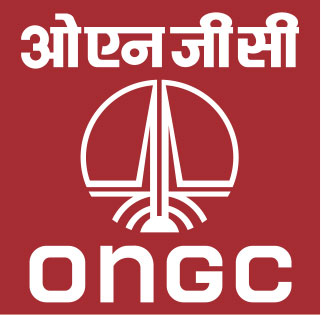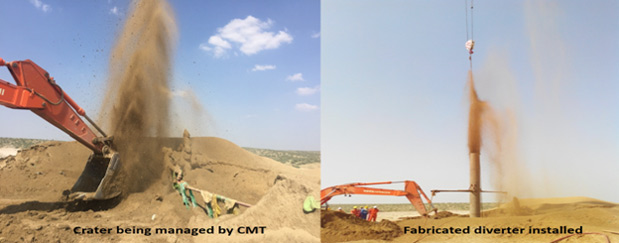Sea Survival Training
- Why is Sea Survival Training critical?
- ONGC’s Sea Survival Centre: A National, and indeed, a Global asset
- Safety is paramount and valuable
- A Training for all!
- Other important training protocols
ONGC Crisis Management Team has proved yet again that whether it is mountains of Arunachal or desert of Thar in Rajasthan, they are second to none in controlling oil-field Blowouts. ONGCReports reconstructs the success story.
Background:
Dandewala oil field is situated 50 kms from temple town of Tanot in Jaisalmer district of Rajasthan at India-Pakistan border. Dandewala oil field was discovered in the year 1989 by Oil India Ltd. Only gas is produced from this field and the total Oil India’s production from Rajasthan project is around 7 lac cubic meter per day. The gas is supplied to 270 MW gas based power plant of RSEB at Ramgarh, 60 kms from Jaisalmer.
Incident:
Well DND#9 was drilled in the year 1997 by Oil India Ltd. The well was drilled up to 1055mtrs and perforated in the interval 924.5mts- 927.5mts. Later a bridge plug was set at 923mts and zone 915.5-918.5 was perforated. The well was producing gas @ 77650 SCMD through 10mm bean and happens to be the most prolific well of that field. On 1 March 2015 during regular well checking, water bubbles were noticed due to heavy rain on the previous night. Oil India team tried to kill the well by pumping through tubing and annulus but they could not get any return and gas seepage due to surface broaching increased.
On 29 September 2015 during such well killing attempt, the surface broaching increased further resulting in a surface blowout. Oil India Ltd sought the help of ONGC management, Shri Shashi Shanker Director (T&FS) responded quickly and directed Head CMT Corporate to extend all support to Oil India Ltd for mitigating the crisis on war footing.
Head CMT Corporate Mr. D Pramanik immediately mobilized a team from ACMT, Ahmedabad in the evening of 29 SEpteber 2015. The ACMT reached site on 30 September 2015 and reviewed the situation. The control plan and requirement was given to M/s OIL from H-CMT. It was instructed to OIL India to make 02 bleeding line one from tubing and other from annulus to bleed the gas so that surface charging is reduced and there is minimum damage at the surface. This was flawlessly executed by CMT present at the site.
Looking at the severity of the incident Head CMT-Corporate Mr D. Pramanik and Mr Ajay Dixit, DGM (D) reached site on 01.10.2015 and took control of the situation.
On reaching the site it was observed that the well was blowing gas with sand around the cellar pit area. The tubing and annulus was being released through choke via 12mm, 16mm, bean. Flowing pressure 38Ksc and 50 Ksc. This was further reduced to 10 Ksc by removing the bean.
Blowout control Operation:
30 September 2015- 02 October 2015
A mitigation plan was chalked out and all inputs and requirements were given to M/S Oil India Ltd for controlling the well. To prevent well catching fire 02 fire monitors were placed to cool the gas flow and all the electrical supply and mechanical equipment were de-energized to eliminate any source of ignition.
3 October 2015 – 7 October 2015
Prepared and filled sand bags and filled the crater around cellar pit with the same.Prepared an extra line from choke manifold to bleed annulus and bled gas via tubing and annulus in full bore.
Pumped 2m3 water followed by 80m3 mud of 11 ppg through tubing and attempted to kill the well. However the well could not be killed as it was found from mud returns that the tubing, casing and the outer casing all are compromised and interconnected around 160mts from top and other depths also.
Decided to kill the well by running in Coil Tubing upto the bottom. Made arrangement to mobilize CT unit. It was not a conventional well killing job as gas was blowing from cellar pit area along with sand, it was required to keep the CTU at a distance of 45mts from the well in the upwind direction to carry out the job safely. It required procurement of more Hydraulic hoses for CTU and mobilization of 150 Ton crane to hold the injector assembly of CTU.
Started digging of water pit to store water for fire pumps. On the request of M/S Oil India, Director (HR) Directed ONGC fire service to mobilize the team and equipment from Mehsana and Ahmedabad. Two more CMT experts were mobilized from central CMT, Ahmedabad.
 Initial Pumping attempt from tubing
Initial Pumping attempt from tubing
8 October 2015 – 11 October 2015
To safe guard the well head and X-Mas tree laid down wire ropes and anchored all around the well and tightened the turnbuckle on all four anchors and secured the wellhead and X-Mass tree. Digging of water pit completed and plastic lining was put to prevent seepage of water. Filled the pit with water. Hydraulic hoses and 150 ton crane reached site from Mumbai. ONGC fire team from Ahmedabad & Mehsana also reached site and placed all their pumps and 04 more monitors at designated places. Coil tubing unit and crane was placed at safe distances. Fabricated 2 gratings with full-length tubing to place it around the well to make pathway so that gate valves could be operated.
 ONGC fire pumps placed near water pit
ONGC fire pumps placed near water pit
12 October 2015
The crater size got much bigger overnight. Filled the crater from one side to facilitate working area. Placed the tubing grating at proper place for safe working. Placed the CT unit and rigged it up.R/In CT up to 923 mtrs i.e. bridge plug depth with water circulation. After reaching bottom kept CT at 915mtrs and changed over to mud of sp gr 1.34 gm/cc. Total pumped 108 bbls of water and 162 bbls of mud. Flow from tubing stopped but gas continued from annulus and broaching area. Pumped mud at a maximum pressure of 9000 psi @ around 0.94 bbls/min. Due to tubing length in the unit which was more than 6000mtrs and Nozzle size of 12mm the required pumping rate could not be achieved and well could not be killed.
While P/O CT at 19.30 Hrs, gas flow increased heavily from the crater which created havoc and heavy vibration in working area around X-masstree. Removed the coil tubing with great difficulty working on the crater under violent spurting of gas & mud.
13 October 2015
In the night hours, due to violent flow of gas,crater size increased resulting invigorous vibration of X-mass tree. Both arms of flow line got broken and also annulus line got snapped. Gas was getting released from X-mas tree area from both tubing and annulus. This created panic among the working crew.
CMT stood up to the challenge and with great courage safely filled the crater with sand & sand bags with the help of JCB under constant water umbrella with continuous gas monitoring to prepared the working area ,restore both the releasing lines from the tubing & annulus to cold flare. Opened the crown valve and allowed the gas to flow from top of X-mass tree. Made a new line from tubing to waste pit. Excavated the annulus line and changed the broken line with a new one and restored normalcy.
14 October 2015- 18 October 2015
As there was no option other than bottom killing the well with the help of CTU one CT unit was mobilized from WSS Ahmedabad having less CT length in coil and bigger diameter nozzle. During the complete operations managing crater was most difficult task in this blowout. Due to gas broaching the position of crater would change 02 to 03 times every day. Filling the crater and making path way to work near the X-mass tree was a challenging job by itself for team CMT.To prepare the well for final killing crater was filled and strengthen judiciously, also made a flowtrench from crater to waste pit so that mud coming out during killing, will flow to the pit.Bleeding of gas from tubing and annulus was a continuous process to avoid pressure built up around well. Fabricated one Diverter from 20” casing and installed it on the crater where gas was coming and observed sand and gas being diverted through it but after some time it got chocked.
CT unit and WSS team from Ahmedabad reached site. Placed the unit and pumper and tested the pumping rate and pressure at surface @ 1.2bbls/min at 7500psi. This rate was not enough to kill the well so CMT decided to cut the CT from 2800mts length to 1200mts length to reduce the pressure losses. After shortening the length got pumping rate @ 1.8 bbls/ min at 7500 psi with water.
19 October 2015 - 20 October 2015
Filled the sand and strengthened the sides of crater. Rigged up CT unit and R/In CT upto 917 mtrs with water circulation. Switched over to mud and started pumping mud through coil tubing. This time it was decided to reduce the mud weight to 1.15 gm/cc and also pump mud from tubing/ annulus simultaneously while pumping through coil tubing. Pumped around 54m3 of mud from Coil tubing. Also pumped 20 m3 through tubing and 10 m3 through annulus and flooded the well and seepage area with mud.Well was finaly killed on 19th and kept under observation overnight while filling the well intermittently to check for any possible loss in the well. Next day placed one bottom cement plug of 90 mtrs through Coil tubing and secured the well.Further systematic abandonment plan was given to M/S Oil India Ltd for implementation at their end.
Crisis Management being a very specialized job EC ONGC has approved nominal day rate in comparison to international experts, chargeable for CMT services provided to any organization outside ONGC.
ONGC is likely to earn a revenue of approximately Rupees 2.1Crores for the services of CMT personnel, WSS & fire services rendered to M/s OIL India for Blow out control operations.
 TRIUMPHANT CMT, WSS and Fire Team.
TRIUMPHANT CMT, WSS and Fire Team.
The complete blowout control operation was planned under the leadership of Head CMT Corporate Mr. D. Pramanik GM (D) - and was executed by team of Mr. Ajay Dixit, DGM (D), Nilesh Trivedi CE (P) and A.K.Pradeep, CE (P).
Head WSS Mr S.P.Nainwal ,GGM(P) provided critical support in mobilizing the CT Unit at a very short notice. The CTU team was commendable in carrying out the job assigned to them.
The Fire services of Ahmedabad & Mehsana provided excellent service of providing water umbrella and cooling of gas to prevent fire.
Director (T&FS) & Director (onshore) were in constant touch with Team CMT, ONGC and were constantly monitoring the situation. Both of them complimented Team, CMT for their incredible achievement.
After taming the blowout our CMD, Mr D.K.Sarraf complimented all team members personally by sending a sms: “Today you and the Team CMT has made ONGC proud by controlling OIL’s Jaisalmer well. CMT is the real example of team work, courage, planning, flawless implementation and practical use of domain knowledge”.





